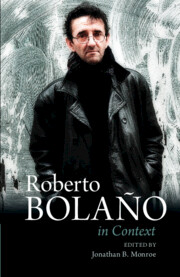Book contents
- Roberto Bolaño in Context
- Roberto Bolaño in Context
- Copyright page
- Contents
- Contributors
- Chronology
- Part I Geographical, Social, and Historical Contexts
- Chapter 1 Mapping Bolaño’s Worlds
- Chapter 2 Chile, 1953–1973
- 3 The Pinochet Era, 1973–1990
- Chapter 4 Dictatorships in the Southern Cone
- Chapter 5 Mexico City, 1968
- Chapter 6 Mexico City, Paris, and Life versus Art
- Chapter 7 Spain, Europe: 1977–2003
- Chapter 8 Transnational Currents: Europe and the Americas
- Part II Shaping Events and Literary History
- Part III Genres, Discourses, Media
- Part IV Aesthetics, Culture, and Politics
- Further Reading
- Index
Chapter 8 - Transnational Currents: Europe and the Americas
from Part I - Geographical, Social, and Historical Contexts
Published online by Cambridge University Press: 15 December 2022
- Roberto Bolaño in Context
- Roberto Bolaño in Context
- Copyright page
- Contents
- Contributors
- Chronology
- Part I Geographical, Social, and Historical Contexts
- Chapter 1 Mapping Bolaño’s Worlds
- Chapter 2 Chile, 1953–1973
- 3 The Pinochet Era, 1973–1990
- Chapter 4 Dictatorships in the Southern Cone
- Chapter 5 Mexico City, 1968
- Chapter 6 Mexico City, Paris, and Life versus Art
- Chapter 7 Spain, Europe: 1977–2003
- Chapter 8 Transnational Currents: Europe and the Americas
- Part II Shaping Events and Literary History
- Part III Genres, Discourses, Media
- Part IV Aesthetics, Culture, and Politics
- Further Reading
- Index
Summary
From his Rimbaldian early poetry to his tri-continental and globe-spanning novels, The Savage Detectives and 2666, Bolaño maintains a critically “exilic” distance from both literary and political forms of nationalism. Writing, in his own words, from a ‘wild’ space ‘equally distant from all the countries in the world’, Bolaño inscribes poetry in particular under the weight of a double destitution: as a synecdoche for poverty, exile, errancy and disappearance, on the one hand, and for a will to become ungovernable on the other. Yet, in mapping out the cumulative wanderings of these errant poet-underdogs, Bolaño’s oeuvre does not stop at exposing the ‘nation’ to its anomic ‘unhomeliness’ in times of globalization. Indeed, in radicalizing both Baudelaire’s spirit of indifference to social forms and Melville’s dismantling of the narrative form, Bolaño exposes both world and work to radical contingency, making the errant poetic-underdog the figure of radical ungovernability. Tracing these constellations through brief discussions of ‘The Romantic Dogs’, The Savage Detectives, Amulet, a selection of short stories from Putas asesinas, 2666, and Antwerp, the chapter draws its theoretical inspiration from Giorgio Agamben’s essay ‘What is a Destituent Power’.
Keywords
- Type
- Chapter
- Information
- Roberto Bolaño In Context , pp. 88 - 98Publisher: Cambridge University PressPrint publication year: 2023

